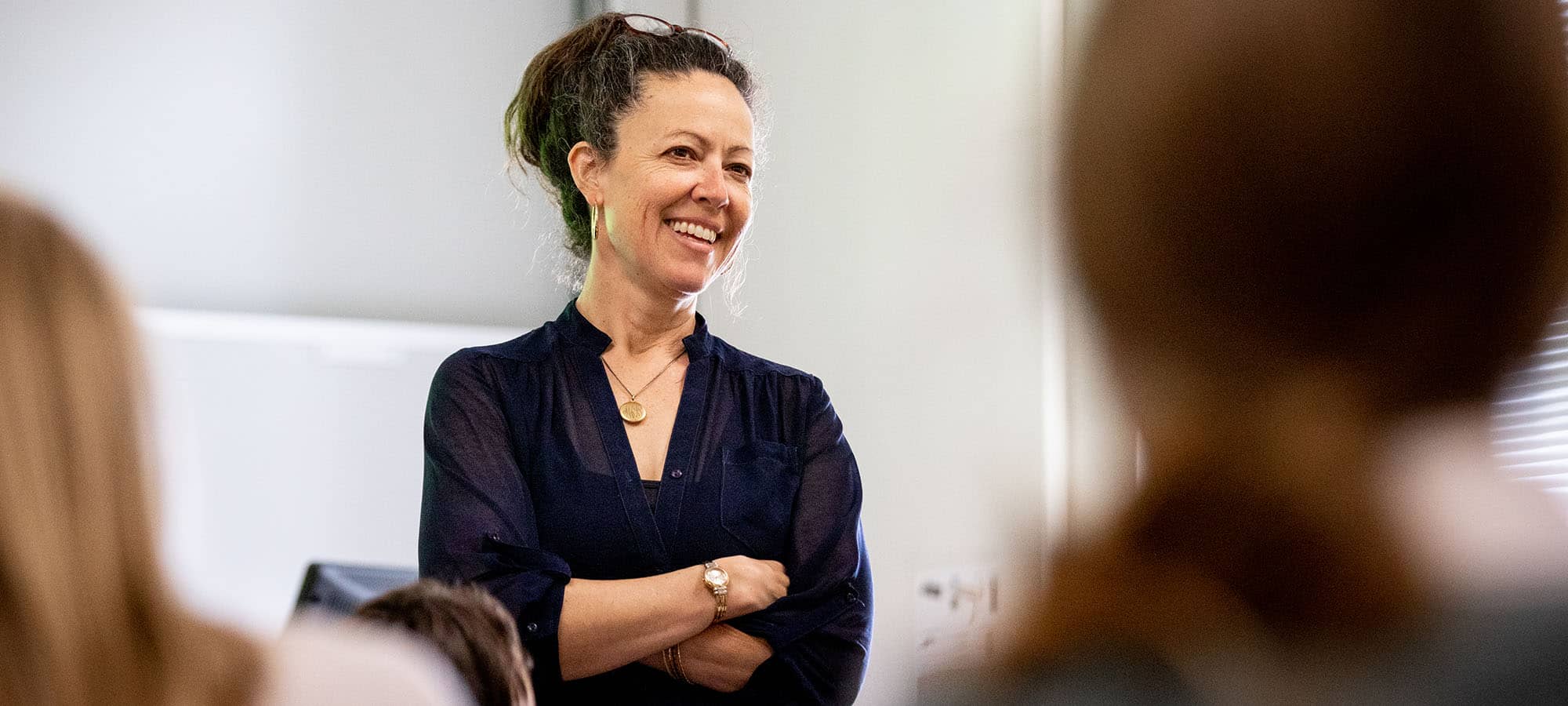
Positively Parry
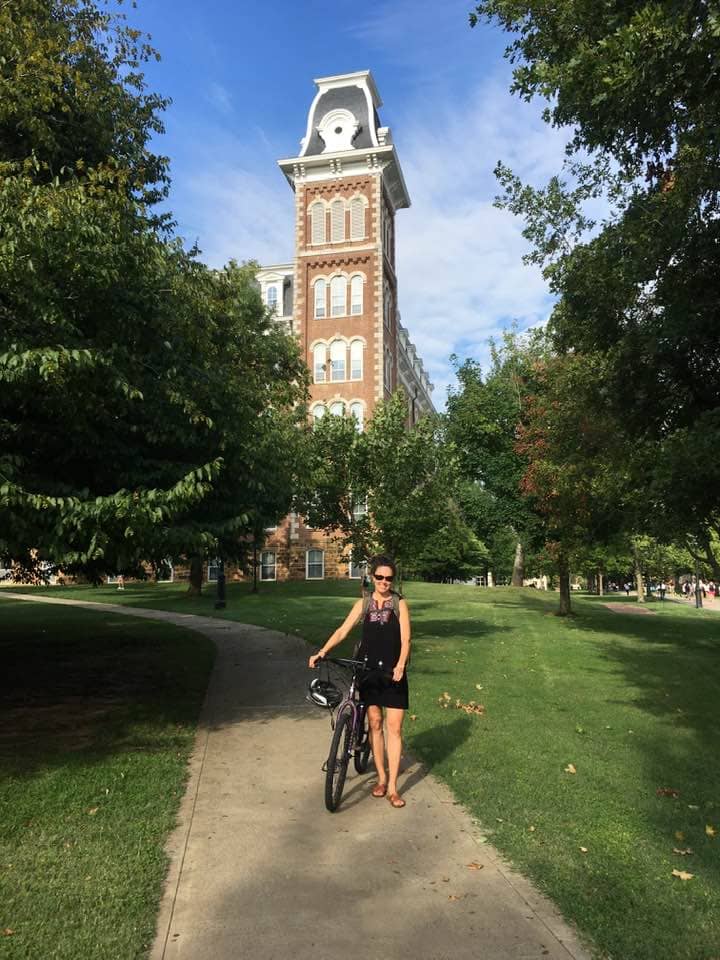
Photo credit: Matt McGowan
Janine Parry has been a faculty member at the University of Arkansas for nearly 25 years and says her students have always helped her feel hopeful. “They’re so curious, so patient and so kind,” she says. “They really want to help each other and the world.”
Her students, though – both past and present – would argue that she’s the one who helps them. Over the years, Parry (who now carries the title of University Professor) has developed a reputation for being an inspiring teacher who also contributes meaningful research to the field of political science. And her former students sing her praises long after graduation.
“I can confidently say that Dr. Parry has been one of the most influential people on my personal and professional life,” said Heather Harbach, a 2001 graduate from the U of A. “As a first-generation college student from rural Arkansas, her classes introduced me to so much more than I expected, even beyond American politics and political science.”
Harbach isn’t alone in her sentiments about Parry. Year after year, more students leave the Hill infused with passion and charisma from Parry’s classes.
“Every class was an awakening of my spirit, like a light turning brighter with each turn of the syllabus,” Harbach says. “She exposed me to options, and I believe that is what teaching is all about – the introduction to new possibilities that one can process within your own experiences, then apply those to new opportunities ahead.”
A Passion for Poly Sci
Parry comes from a family of K-12 teachers but chose to study journalism as an undergraduate at Western Washington University. When an American National Government professor introduced her to political science and another told her, “You’d be good at this,” she started to imagine other possibilities for her future.
“I had no idea how professors became professors,” she says. “Someone showing you the way is formative.”
Parry earned her master’s and doctorate from Washington State University, and, in 1998, received an offer to come to the U of A.
The year before, renowned professor Diane Blair had retired, after spending nearly 30 years specializing in Arkansas politics and women in politics. Though Parry argues that no one could fill Blair’s shoes, Parry herself has become an expert in state politics and has been honored with teaching awards, just like Blair during her tenure with the university.
“One thing I teach is that you don’t have to have strong feels to do well in my class,” she says, speaking about the section of American Politics that she teaches. “I know students can come into the class feeling apprehensive, because the volume has been turned up on politics. My approach is temperance and problem solving.”
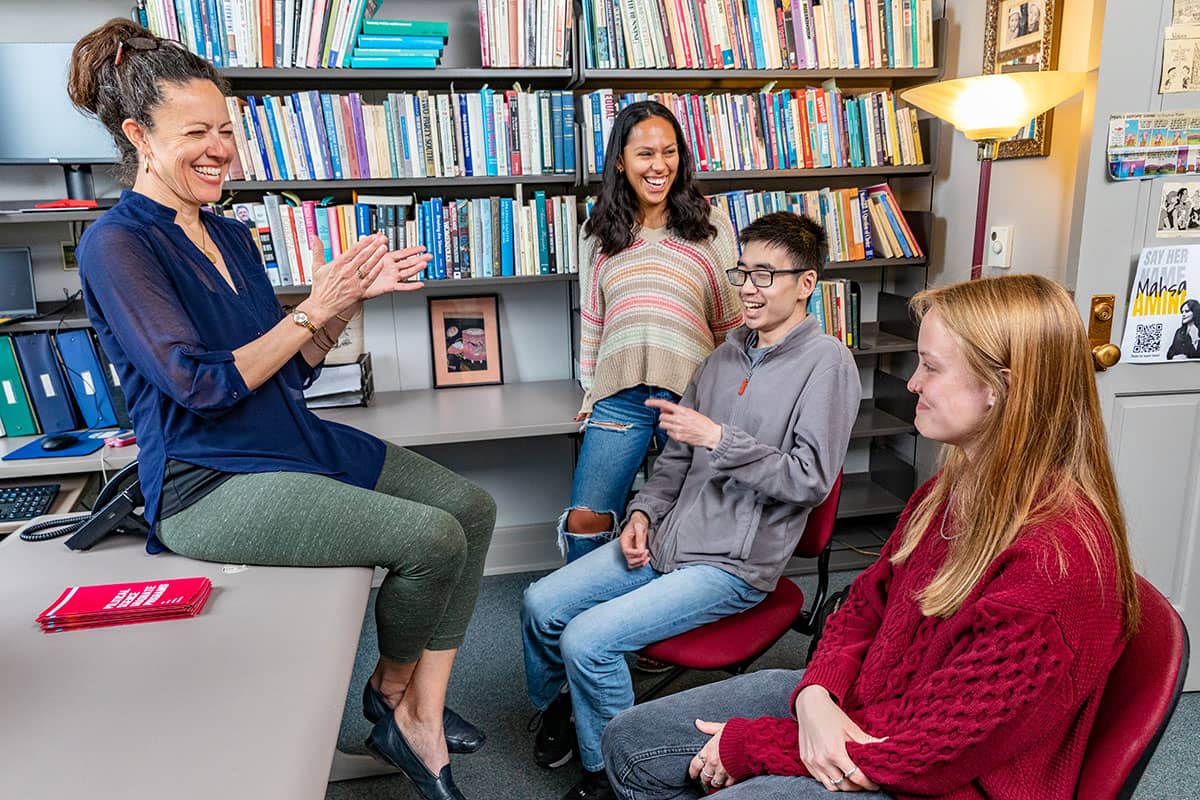
Her approach works because students frequently comment about how transformative and eye-opening her classes are. Daniel Shi, a student in Parry’s spring 2023 Gender and Politics class, reaffirms this.
“She is incredibly understanding about the climate of her class,” he says. “She teaches some heavy stuff, and in today’s world, it is incredibly difficult to straddle everyone’s opinions and teach a class like this. She encapsulates the role of an educator and mentor for students.”
Mutual Admiration
The feeling of respect between Parry and her students is mutual. She sees how aware they are about the number of problems to solve in the world and the impending pressures they feel to fix everything.
“Overall, the students today come from a smaller generation,” she says. “I encourage them to start small and start locally. I have a lot of faith and trust in them; I know they want to and can do great things.”
Parry says her approach to teaching and what she enjoys most has changed over the years.
“The most challenging piece for me is that the way people learn is changing,” she says. “There’s a widening gap between how students access information, including the hyperacceleration of both the pace and the various platforms. I’m trying to just ask the students about the best way to reach them, and adapt to the way they learn.”
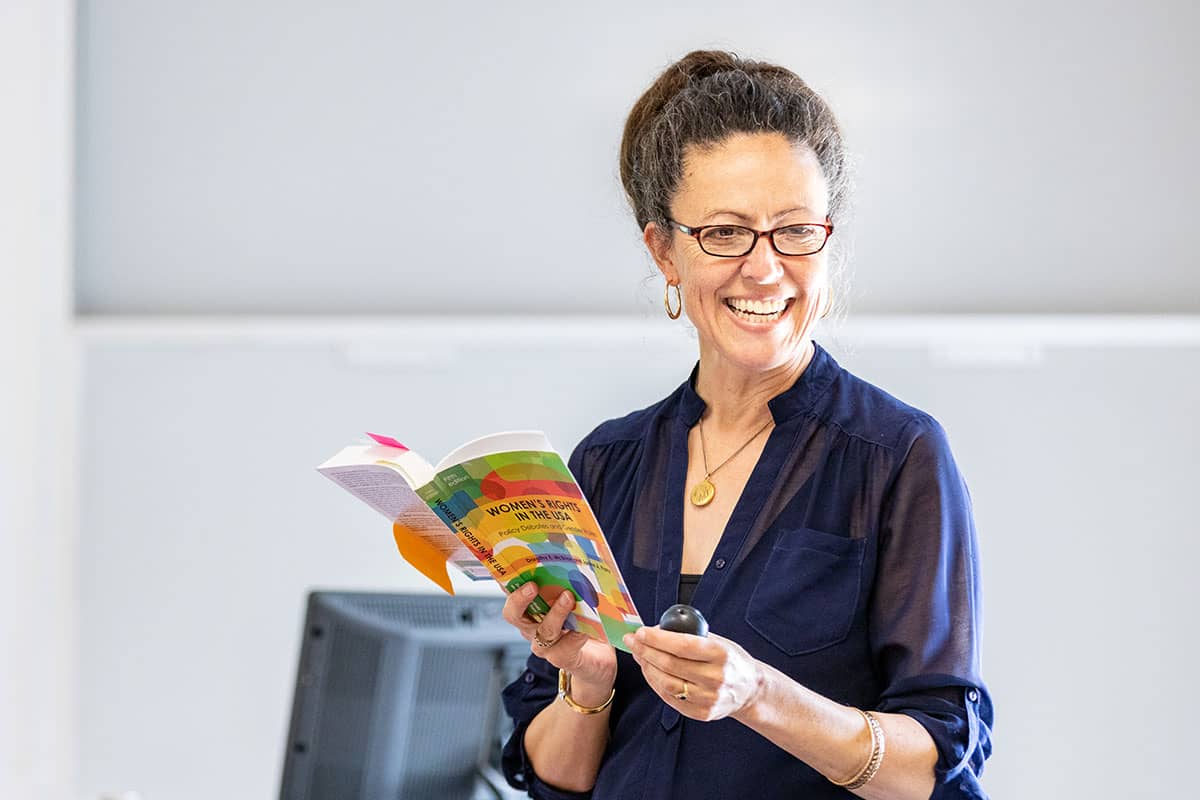
Olivia Kuester, a political science major, took Parry’s Arkansas Politics class in spring 2023. She says Parry is a treasure to be around and to learn from.
“Her passion and dedication to her work practically radiates from her, easily distinguishing her as the best professor I have had at the University of Arkansas and drawing me back to her courses semester after semester,” Kuester says. “She is also the most student-oriented professor I have had the opportunity to learn from.”
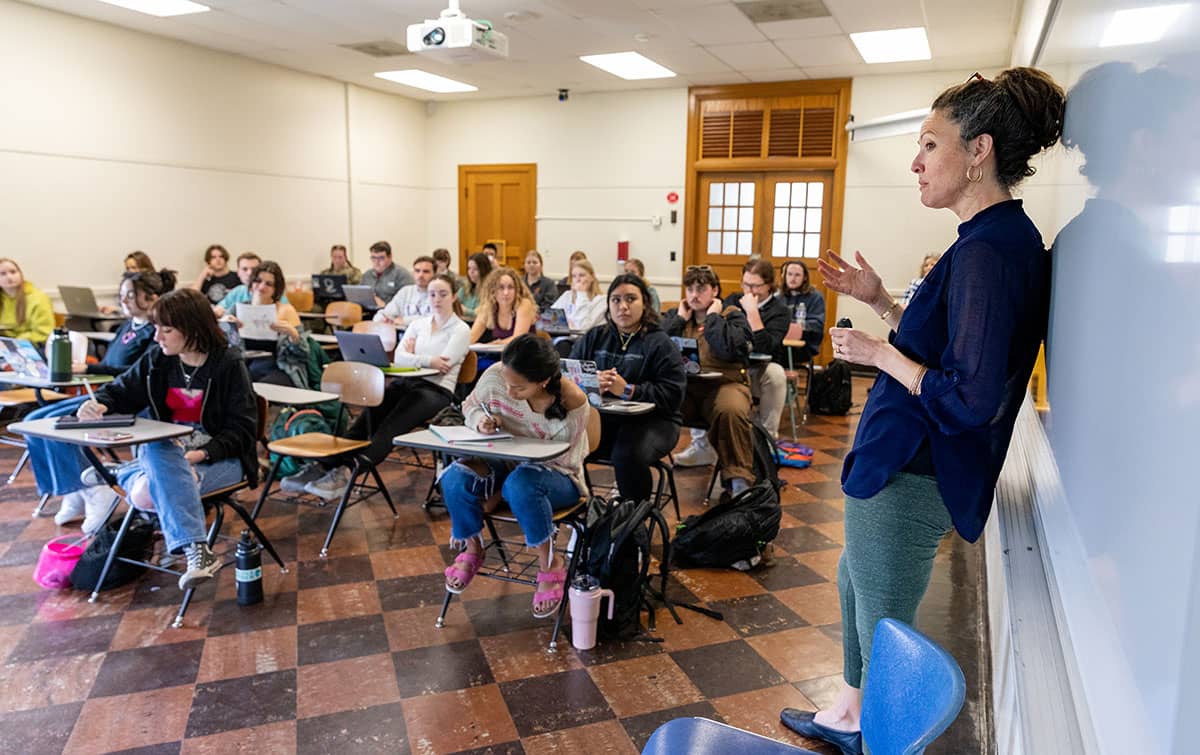
Joanna Resendez, a classmate and fellow political science major, agrees.
“She exudes a level of comfort I’ve only encountered with a few professors, one which has empowered me to speak and give my thoughts in class because I know she genuinely wants to hear them,” Resendez says.
Survey Says
In addition to her reputation for being a stellar teacher, Parry is also widely known for her work with the Arkansas Poll, which every fall supplies impartial public opinion information on matters of policy and politics to public officials, researchers, students and the public.
 The Arkansas Poll serves the legacy of Diane Blair, in whose honor it is endowed
through the Diane D. Blair Center of Southern Politics and Society in the University of Arkansas Department of Political Science.
The Arkansas Poll serves the legacy of Diane Blair, in whose honor it is endowed
through the Diane D. Blair Center of Southern Politics and Society in the University of Arkansas Department of Political Science.
“It’s one of the oldest public opinion projects in the country,” Parry says. “We’ve spoken with more than 20,000 Arkansans over the years. I’m proud of it, because there’s good, important public service coming out of our flagship, land-grant school.”
The poll originated under Parry’s leadership and offers the public, policymakers and journalists a more frequent portal into public preferences than elections allow. There’s a clear public service component to it, because fields such as political science, psychology and sociology find public opinion research extremely valuable. One thing that makes the Arkansas Poll unique is that much of the data can be tracked over time – something not all states can claim.
“We’re still the only wholly public opinion project in Arkansas, meaning everything we do is totally transparent,” Parry says. “I think that’s important.”
Parry also has a book project in the works with fellow professor Andrew Dowdle – a project that was initiated by her work with a group of Honors College students.
She explains, “We’re looking at one-party monopolies in American states. In the 1940s and 50s, it was very common to see states with one-party monopolies, then things changed for a bit and now there’s another big uptick in this trend. Now, you can see monumental levels of monopoly at the state level.”
 Parry and Dowdle’s study, which documented both the long-term frequency and the dramatic resurgence of one-party
monopolies in the politics of the American states, appeared in State Politics and Policy Quarterly.
Parry and Dowdle’s study, which documented both the long-term frequency and the dramatic resurgence of one-party
monopolies in the politics of the American states, appeared in State Politics and Policy Quarterly.
Parry’s research examines the scope and magnitude of this trend during different decades and in different regions, as well as their causes and consequences.
“Ultimately, this affects voter turnout and policy extremism,” she says. “Red states are getting redder and blue states are getting bluer, but the consequences aren’t positive for citizens in either situation.”
Nathan Coulter was a student of Parry’s from 2010 to 2014, when he graduated cum laude with a Bachelor of Arts in Economics and Political Science. He now practices law in Little Rock.
Parry served as Coulter’s faculty advisor for his honors thesis, so he had the opportunity to work with her in both classroom and research settings. And while Coulter calls her a “remarkable instructor,” he says he could also tell that research was a passion of hers.
“She loved not only digging into the numbers, but how and why these numbers looked the way they looked – for example, why were people voting or reacting this way to certain variables,” he says. “She put the ‘science’ in ‘political science.’”
Most Likely to be Remembered
With all of the positivity surrounding Parry, it’s no wonder that her teaching, research and service continue to be recognized by the university and external organizations. She has received the Dr. John and Mrs. Lois Imhoff Award for Outstanding Teaching and Student Mentorship, the Fulbright Master Teacher Award and the Arkansas Alumni Association Faculty Distinguished Achievement Awards for Teaching and for Service. In 2020, she was named the Arkansas Political Science Association Distinguished Scholar for her research and service to the association.
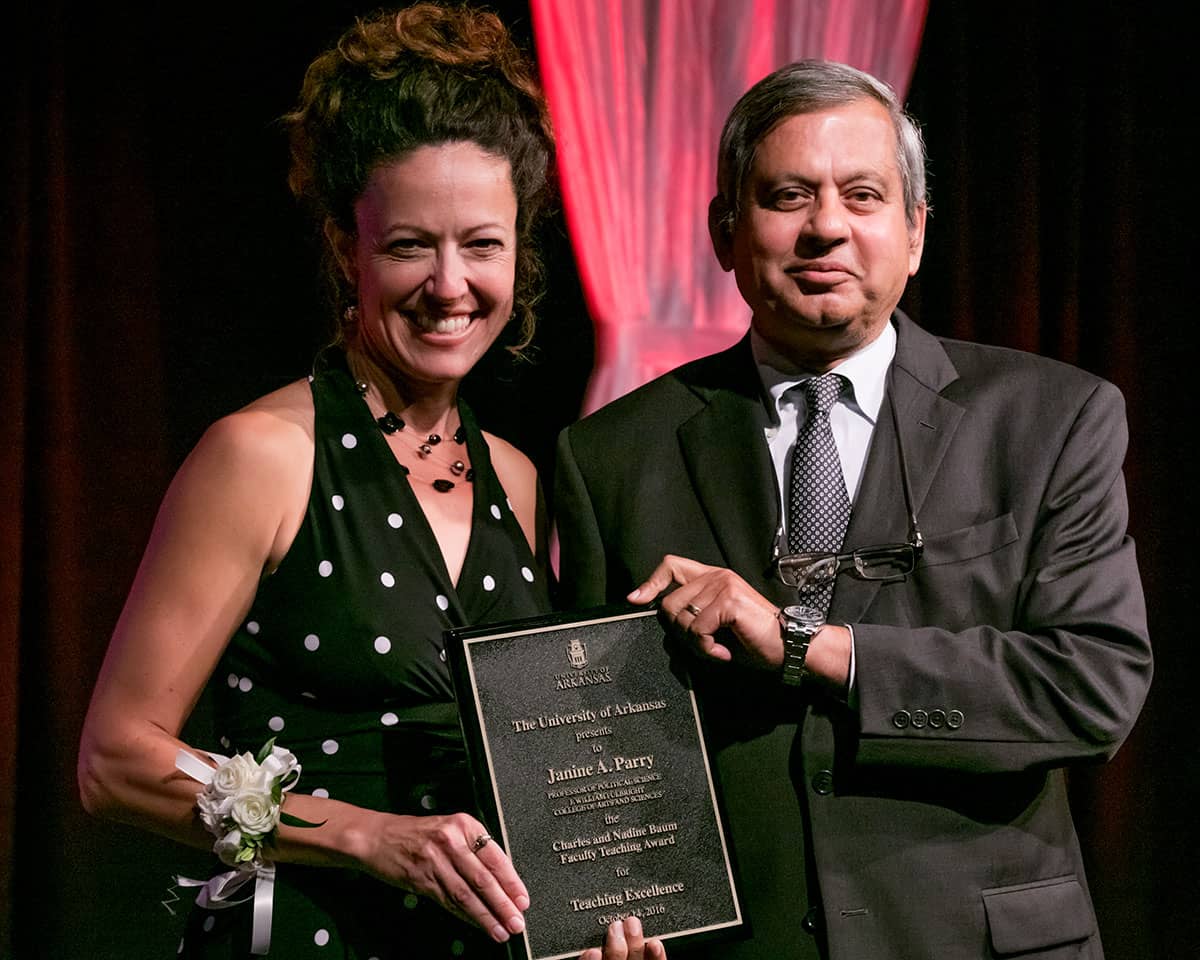
The awards, though, are just more proof that Parry’s heart is behind everything she does – most notably, helping her students.
TyCam’Ron Mack, a 2021 graduate, says, “Janine Parry has been such an inspiration to me and my educational journey. I took every class I could with her. Every discussion, every lecture and every group assignment enabled us to grow as students but also as adults. Every milestone in my life since college has been marked by Janine Parry. I am forever in debt to her for investing in me.”
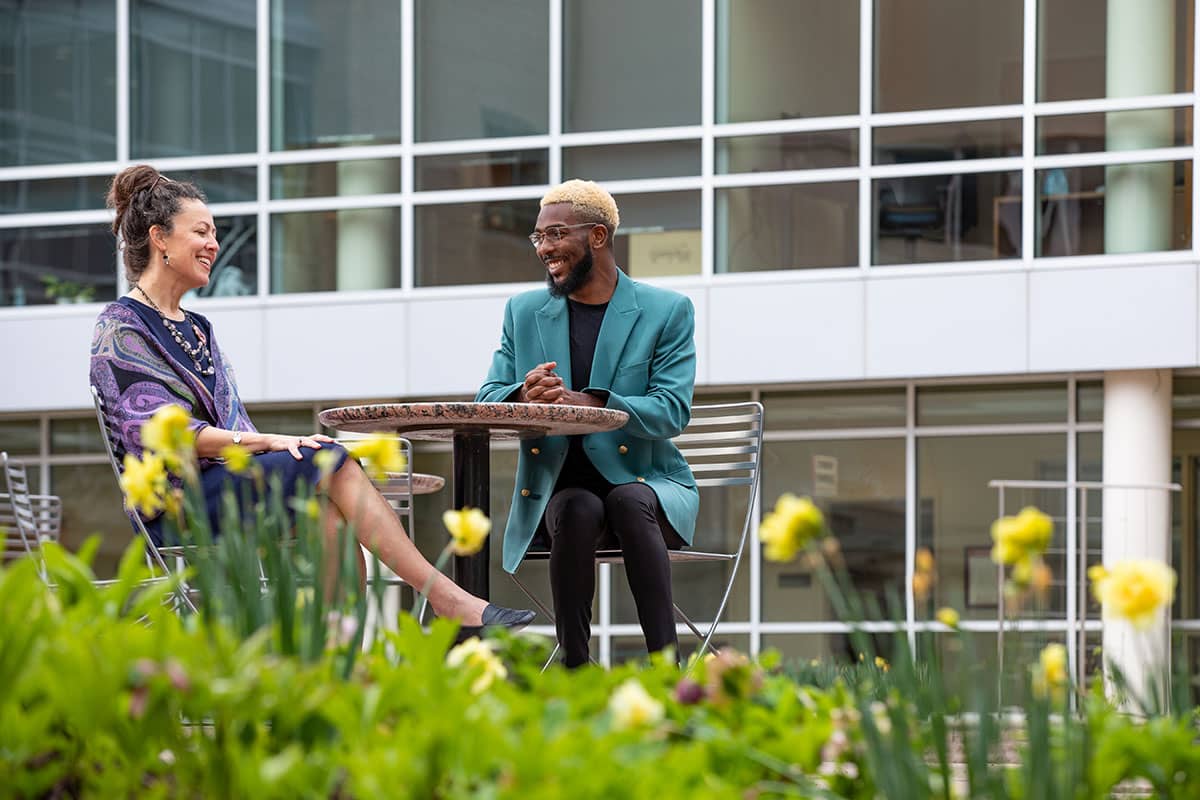
“The well-being of our beautiful, fragile experiment in group governance motivates me, together with the fact that these thoughtful, earnest young people are desperate to learn how to preserve and improve it,” she says. “The least I can do is help them do it!”